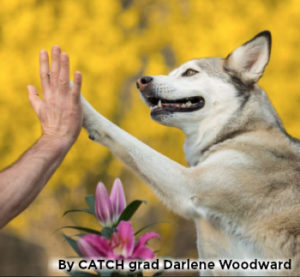Life with a Challenging Dog Can Make You a Skilled Trainer
by Marcela Koehler
Even though it’s been ages since Lassie became famous on TV, dog owners and trainers today still face the challenge that many people have “Lassie-esque” expectations of dog behavior. When pets like Lassie and Rin Tin Tin were heroes of family television, they made it look like dogs would understand everything we say. The idea of dogs being born to serve our every whim seems far too robotic to many of us these days, but the dog who perfectly “obeys his master” is still an image that is embedded in our culture.
When you start on your dog training journey, you may picture that your dog is always supposed to be right by your side, perfectly in tune with your thoughts and movements. Don’t worry if that seems a bit daunting, the reality for many dog trainers is very different – even for expert professionals. Our dogs listen of course, but we let them be their fun-loving selves, too! Being in tune with our every whim like Lassie is not feasible for the vast majority of pet dogs, and not every trainer expects all their dogs to “report for duty” with military precision all the time. In fact, many of our dogs are wonderfully imperfect, just like their guardians.

Our own dogs become our teammates and teach us so much! This is Kota, the beloved husky of a one-time featured student and now CATCH graduate, Darlene.
As a Program Director at CATCH, it is a concern that I hear time and again from new students: “Can I be a successful dog trainer if my own dog has behavioral issues?” My answer is always the same, “Absolutely!” You are likely to become an even better trainer from the skills that you’ll gain living with a challenging dog. You learn firsthand how to manage and modify the problem behaviors happening in your home. The rare combination of necessity, inspiration, and experience that comes with this situation has propelled many owners of difficult dogs to go from do-it-yourself-behavior-problem-solvers to studied dog trainers!
Often when dog owners finally get to the point where they reach out to a dog trainer for help, they are embarrassed and feel a loss of control in their lives. You can put them at ease by sharing your own experiences, and talk to them about the progress you have made with your own difficult dog. This is a great example of one of the most important skills for a dog trainer – empathizing with the client and letting them know they are in good company, that you understand where they are coming from, and that you have the skills to help.
Most first-time dog owners take on a puppy without all of the knowledge to raise and socialize them effectively to help create the most well-adjusted dog possible. Sometimes owners get lucky and end up with a very well-behaved dog, but more likely, many of us end up with some behavior challenges that we soon realize we will always have to “work around” or continually work to improve. Opening your home to a “behaviorally challenged” dog is nothing to be ashamed of; it can be something to be proud of, and it will certainly be a learning experience.

Puppies present us with the precious opportunity to bond and train during the critical socialization period. But, not everyone knows how to take proper advantage of that short time window the first time around.
Many students start our program after having had their dogs for years, and we hear the same concern: “If only I had a time machine and could have started this program before getting the dog!” That is because they are learning so much about the importance of socialization and how crucial those first couple of months are for developing a dog that can be both comfortable and focused in many different situations. It’s true that you can’t rewind the clock and start over with early socialization. But as a trainer, you can learn from everything you missed out on doing with dogs you’ve raised in the past and apply those lessons to the dogs you raise in the future. That includes dogs you may be raising and helping your clients with theirs! (Side note: we have a great article on the keys to raising a very well-behaved puppy here.)
Give yourself credit for the hard work that you have done and will continue to do with the difficult dogs in your life. As you gain experience with challenging dogs, you continually hone your approach for raising and training future dogs. Many trainers work their way up to finding and training the “dream dog” that they can bring to their classes and show off in demonstrations. If you are determined to learn through experience and study, we’re willing to bet that that “dream dog” is in your future!
~
Are you a fanatic for learning more about behavior and training? CATCH courses and workshops go beyond basic obedience to help students work with dogs that have behavioral issues. We find the problem-solving process to be fascinating: from basic issues like jumping, pulling, barking, and house training to learning about the more advanced challenges like fear and aggression cases. Many of our students turn their passion for dogs into newfound skills and use them to work with dogs that otherwise would not have the easiest time finding a forever home. Get in touch with us to learn more!






 Phone:
Phone:
Good article, Marcela!